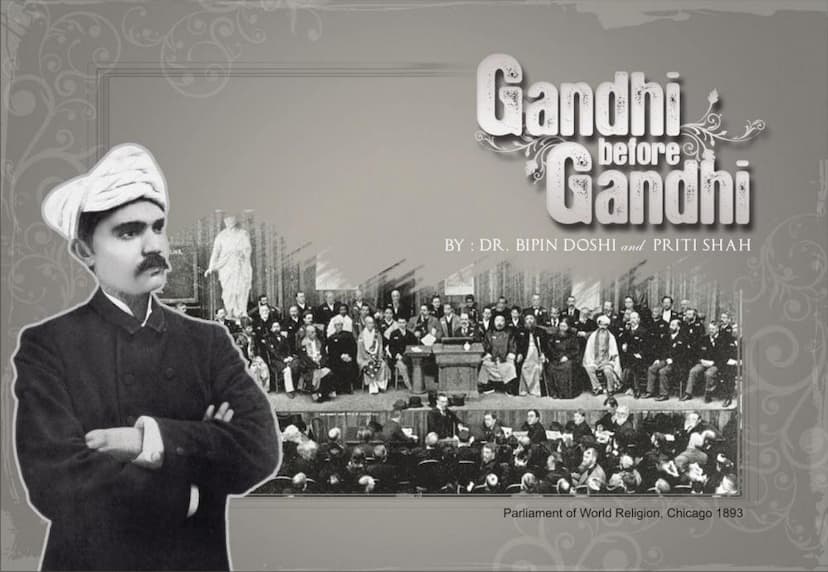Gandhi Before Gandhi
Added to library: September 1, 2025

Summary
This document, "Gandhi Before Gandhi," authored by Dr. Bipin Doshi and Priti Shah, published by the Jain Academy Educational Research Center Promotion Trust, Mumbai, serves as a tribute to Virchand Raghavji Gandhi (VRG). The book aims to bring to light the life, work, and significant contributions of VRG, a lesser-recognized yet immensely influential figure from India.
The book highlights VRG's role as a brilliant scholar, orator, and advocate for Indian culture and religion in the late 19th century. It positions him as a "Gandhi before Gandhi," suggesting his pioneering spirit and intellectual prowess prefigured the more globally recognized Mahatma Gandhi.
Key aspects covered in the book include:
-
VRG's Representation at the Parliament of World Religions (Chicago, 1893): VRG was a key delegate representing Jainism and Hinduism at this seminal event. The book details the historical context of the Parliament, the diverse religious landscape of the time, and VRG's impactful participation. He is credited with being the first to introduce Jainism to the Western world, eloquently defending Indian culture and civilization against prevailing Western misconceptions and missionary critiques.
-
Critique of Christian Missions in India: A significant portion of the book is dedicated to VRG's critical analysis of Christian missionary activities in India. He argued that these missions, often driven by ignorance and a narrow dogmatic creed, were not only unsuccessful in genuine conversion but also detrimental to Indian spirituality and social fabric. He highlighted the missionaries' misrepresentation of Indian culture and their role in social disruption.
-
Defense of Indian Culture and Religions: VRG vigorously defended Hinduism, Jainism, and Indian traditions against prejudiced portrayals by Western missionaries and scholars. He presented a nuanced understanding of Indian philosophies, customs, and history, challenging prevailing negative stereotypes.
-
Exploration of Indian Philosophies and Practices: The book delves into VRG's profound explanations of various Indian philosophical concepts, including:
- Jainism: Its antiquity, core principles (Ahimsa, Anekantavada, Syadvada), the concept of Jina, the nature of the soul, karma, rebirth, and ethical guidelines.
- Hinduism: The essence of Hinduism, the concept of Atman (soul), the relationship between soul and body, the science of eating, breathing (Pranayama), Yoga, Meditation, and the five great sacrifices.
- Other Philosophies: He also discussed Buddhism, the significance of the Swastika symbol, and the concept of concentration.
-
VRG's Lectures and Writings in the West: The book showcases VRG's extensive lectures delivered across the USA and UK between 1893 and 1901. These lectures covered a wide range of topics, from religious philosophies to social customs and sciences like Yoga and mesmerism. His intellectual depth, eloquent presentation, and broad knowledge earned him accolades and influenced Western perceptions of India.
-
The "Unknown Life of Jesus Christ" Theory: VRG played a role in translating and promoting Nicholas Notovitch's controversial work suggesting Jesus Christ may have visited and studied in India. VRG presented research and arguments supporting this theory, despite facing criticism from Christian theologians.
-
Impressions of America and Western Society: VRG shared his observations on American hospitality, education systems, industrialization, family structures, and religious conditions. He offered frank and honest critiques, often drawing comparisons with Indian societal norms and values.
-
VRG's Personal Life and Legacy: The book provides details about VRG's family, his academic brilliance, his commitment to Jain causes (like preventing cattle slaughter and protecting pilgrimage sites), his humanitarian efforts (organizing famine relief), and his untimely death at the age of 37. It also highlights his friendships with figures like Swami Vivekananda and his influence on Westerners who adopted Jainism.
-
Contributions to Jainism: VRG is recognized for being the first to introduce Jainism as an independent, ethical religion to the West. He fought for the rights of Jains and preserved their religious heritage through his writings and advocacy.
-
Literary Contributions and Legacy: The book acknowledges the significant efforts of Mr. Bhagubhai Karbhari in collecting, editing, and publishing VRG's speeches and writings, which were crucial in preserving his intellectual legacy. It also lists various other publications and initiatives dedicated to commemorating VRG's life and work.
In essence, "Gandhi Before Gandhi" presents Virchand Raghavji Gandhi as a pivotal figure who bridged Eastern and Western thought, championed Indian heritage, and offered profound insights into Jainism and Indian philosophies at a critical juncture in history. He is lauded as a "Great Ambassador of Indian Culture and Heritage" and a brilliant exponent of Indian wisdom.